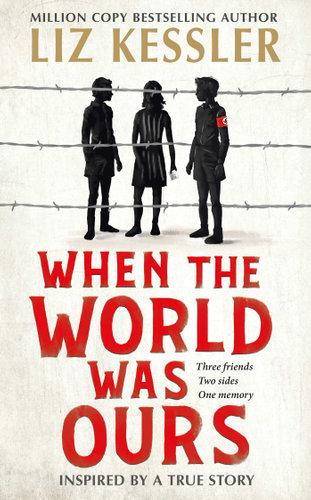Liz Kessler, When the World was Ours, Simon & Schuster, February 2021, 320 pp., RRP $19.99 (pbk), ISBN 9781471198298
He could never show he had moments of doubt. He could never even hint at it. He was in far too deep for that now.
Liz Kessler’s When the World Was Ours is a young adult novel set during World War II. It is inspired by the true story of her father and his parents who were able to escape Nazi-occupied Czechoslovakia thanks to the help of a British couple they had met only briefly a number of years before. Kessler has grown this piece of family history into a powerful story about three Viennese children — Leo, Elsa and Max — whose friendships and lives are ruptured by the Holocaust.
As their stories diverge, all three children lose their innocence in different ways — Leo and Elsa because they are Jewish, and Max because he has to harden his heart. Like Kessler’s father, Leo and his mother manage to escape but Elsa and her family experience the full horrors of the Nazi invasion and life in the ghettos and camps. Max is the son of an ambitious Nazi commander, and it is his point of view and development that gives this book a point of difference from other Holocaust fiction for young readers. Max is not cruel by nature, but as the situation around him escalates he stymies his compassion. At first this seems like an act of survival, but as the story progresses the lines seem to blur between self-preservation and him believing the propaganda he is soaked in.
When the World Was Ours is a highly churnable book thanks to its short sharp chapters told from alternating points of view. The characters brim with internal conflict and the action traverses Europe, so there are themes and historical information aplenty to explore. It is a great independent read and has the potential to be an engaging class text with both rich content and effective writing craft to discuss.
I’m sure that writing fiction for young readers about the Holocaust must feel impossibly hard at times. I can only imagine how exhausting it would be, balancing the fine line between feeling a responsibility to both the history and the readers — but I think Kessler has done an amazing job. The subject matter is dark, but the writing is restrained and never gruesome. There were a few moments where the story felt a bit trite — where the use of coincidence felt invasive and unbelievable. But once I’d reminded myself that this was a novel not a memoir, and one for young readers at that, I was able to embrace the coincidences as plot devices that were probably necessary for brevity and to mitigate the otherwise overwhelming bleakness of the subject matter. Overall, this is a thought-provoking book about important subjects. Not just history but feeling torn between what you believe to be right and what is happening around you.
Reviewed by Liz Patterson






